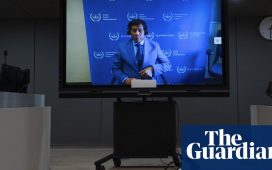One of Britain’s leading family lawyers, Maggie Rae, who has died suddenly aged 74, had a lifelong belief that it was imperative for everyone to receive fair treatment from the law, whatever their means or status. She won public attention for representing such stellar figures as Diana, Princess of Wales and the former wife of the Aga Khan, but regarded the dispossessed and the unfashionable as every bit as equal to the great and the good.
A member of the Communist party as a young woman, she joined the Labour party when living in Hackney, north London, with a fellow lawyer, Cherie Booth. The two became close friends – Rae made the bridesmaids’ dresses when her flatmate married Tony Blair – and their relationship would later be cemented by politics.
Rae met her husband, Alan Haworth (who became Lord Haworth in 2004), through their mutual involvement in radical local politics in east London (they married in 1991) and he would later prove a crucial help, as secretary of the parliamentary Labour party, in securing Tony Blair’s landslide election victory in 1997.
Rae was responsible for introducing Diana to the Blairs when she and Haworth hosted a highly successful hush-hush supper in their family home in Hackney in January 1997. Blair’s press secretary, Alastair Campbell, who was there with his partner, Fiona Millar, subsequently revealed in his diaries that, intriguingly, the princess had said – referring to New Labour – that “she would like to help us if she could”.
Rae was born in St Albans, Hertfordshire, the first of five daughters of Harvey Rae and Mary (nee Gardiner). Her mother, who was a social worker and teacher, came from the Moray Firth area of Scotland. Her father worked at the time for Unilever but the family would move often, first to Doddinghurst, near Brentwood in Essex, then to Ghana, where Harvey worked as a horticulturalist and was employed by the famed trading firm the United Africa Company.
They returned to Caister-on-Sea, Norfolk, where the family had a smallholding and their father was a meat trader for Birds Eye. Maggie passed the 11-plus and attended Great Yarmouth high which, because of her peripatetic childhood, was her 10th school.
An early interest in the law came from watching courtroom dramas on the family television – she was particularly impressed by Margaret Lockwood playing an intuitive, highly principled barrister in the 1970s series Justice –and she studied at Warwick University, where she also became active in student politics.
She then financed her own pupillage to train for the bar at 5 Essex Court, Gray’s Inn, by working as a waitress and selling encyclopedias. She was a founder member of the breakaway Wellington Street chambers in Covent Garden, which evolved into the now well-known Doughty Street chambers.
Rae was a strong woman and knew her own mind. She was funny and could be outspoken but she was also unfailingly kind and fair, an attribute which won her the trust of her clients. It was because she liked dealing directly with people that she thus decided after three years as a barrister to become a solicitor and having in 1979 helped found the company Hodge, Jones and Allen, of which she was a partner, she then joined Mishcon de Reya as a partner in 1992.
She was a member of the legal team at this company that represented Diana, Princess of Wales in her divorce proceedings from the then Prince of Wales in 1996. She later worked for Clintons, where she won a landmark ruling on behalf of Karen Parlour, the former wife of the Arsenal and England footballer, Ray Parlour, securing on appeal an increase in her maintenance payments. The decision nearly doubled the settlement made, having been calculated against Parlour’s likely future earnings and set a precedent in what had been an uncertain area of the law.
As one of the country’s experts on matrimonial law and the increasing use of pre-nuptial agreements, she was once asked how much a client should spend on securing correct legal advice for such an arrangement and replied: “More than the flowers, less than the frock.” In 1997 she was the co-author, with Robin Ellison, of Family Breakdown and Pensions.
In 2008 Rae gave evidence at the inquest into the death of Diana, arising from a meeting the princess held with her lawyers at Kensington Palace in 1995, during which she spoke of fears of a plot in which she might be assassinated and then declared “unbalanced”. Rae told the coroner that after the princess’s death “it never crossed my mind that she might have been murdered.”
Rae was a pioneer in her field but always had time to help and mentor younger lawyers and to defend women’s rights. For many years she chaired Refuge, the domestic abuse charity, and had recently taken a role in support of the Asian University for Women charity.
She was a fellow of the International Academy of Family Lawyers and at the time of her death was a consultant with the family law firm Newton Kearns. She and Alan were both enthusiastic members of a walking group, Radical Ramblers.
Haworth died in Reykjavik, Iceland, while the couple were on a cruise in August. He had insisted after being taken ill, however, that she should go ahead with the later cruise he had planned for them both in the Antarctic; it was during this holiday that Rae became unwell.
She is survived by her sisters, Sheila, Rosie and Kate. Another sister, Susan, died young of cystic fibrosis.











